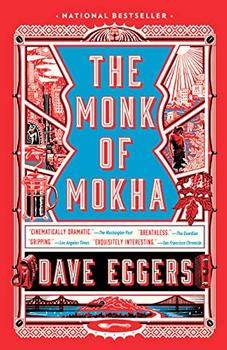Summary | Excerpt | Reading Guide | Reviews | Beyond the Book | Read-Alikes | Genres & Themes | Author Bio

This article relates to The Monk of Mokha
 In The Monk of Mokha, there's a scene in which Mokhtar is assigned to be a translator for visiting Yemeni Tawakkol Karman, who is guest lecturing at UC Berkeley Law School. Tawakkol is the first Yemeni woman, in fact the first Arab woman, ever to be awarded the Nobel Peace Prize. She was honored for her nonviolent activism during the Arab Spring (known in Yemen as the Jasmine Revolution). She won the prize in 2011, sharing it with two other women: Liberia's president Ellen Johnson Sirleaf and Mrs. Leymah Gbowee, credited with leading the Women of Liberia Mass Action for Peace, ending a long civil war there.
In The Monk of Mokha, there's a scene in which Mokhtar is assigned to be a translator for visiting Yemeni Tawakkol Karman, who is guest lecturing at UC Berkeley Law School. Tawakkol is the first Yemeni woman, in fact the first Arab woman, ever to be awarded the Nobel Peace Prize. She was honored for her nonviolent activism during the Arab Spring (known in Yemen as the Jasmine Revolution). She won the prize in 2011, sharing it with two other women: Liberia's president Ellen Johnson Sirleaf and Mrs. Leymah Gbowee, credited with leading the Women of Liberia Mass Action for Peace, ending a long civil war there.
Tawakkol Karman was born in 1979. She studied at the University of Sana'a (Yemen's capital city), became a journalist, and in 2005 founded a human rights group called Women Journalists Without Chains. During this period, she began organizing sit-ins in Tahrir Square in Sana'a. She became a visible and vocal advocate for freedom of the press. Karman and her followers set up and occupied a tent, which became the focal point for demonstrations by women and youth that would evolve into the Arab Spring rebellions of 2011. Her concerns include women's, children's and human rights; literacy; and reform of government corruption on local, national, and global levels.
 In her Nobel Lecture of 2011, she said, "The solution to women's issues can only be achieved in a free and democratic society in which human energy is liberated, the energy of both women and men together. Our civilization is called human civilization and is not attributed only to men or women." More recently, Ms. Karman has become a vocal critic of foreign, weaponized intervention by Iran, Saudi Arabia, the United Arab Emirates, the UK, and the United States. She calls for an end to the arms trade, and decries any nation contributing arms to the "massacres" and "crimes against humanity" in Yemen. She calls for global unity in the quest for peace. With her international platform, she continues to advocate for global human rights, democracy, and the rule of law, into 2018, when the situation in Yemen has been called "the world's worst humanitarian crisis" by the United Nations. In Tawakkol Karman's words, from her Nobel lecture:
In her Nobel Lecture of 2011, she said, "The solution to women's issues can only be achieved in a free and democratic society in which human energy is liberated, the energy of both women and men together. Our civilization is called human civilization and is not attributed only to men or women." More recently, Ms. Karman has become a vocal critic of foreign, weaponized intervention by Iran, Saudi Arabia, the United Arab Emirates, the UK, and the United States. She calls for an end to the arms trade, and decries any nation contributing arms to the "massacres" and "crimes against humanity" in Yemen. She calls for global unity in the quest for peace. With her international platform, she continues to advocate for global human rights, democracy, and the rule of law, into 2018, when the situation in Yemen has been called "the world's worst humanitarian crisis" by the United Nations. In Tawakkol Karman's words, from her Nobel lecture:
"Walls between human societies have fallen down and the lives and destinies of societies have converged, marking the emergence of a new phase, a phase where peoples and nations of the world are not only residents of a small village, as they say, but members of one family, despite differences in nationality and race or in culture and language...Peace does not mean just to stop wars, but also to stop oppression and injustice."
Tawakkol Karman
Tawakkol Karman, Ellen Johnson Sirleaf, and Mrs. Leymah Gbowee
Filed under People, Eras & Events
![]() This "beyond the book article" relates to The Monk of Mokha. It originally ran in February 2018 and has been updated for the
January 2019 paperback edition.
Go to magazine.
This "beyond the book article" relates to The Monk of Mokha. It originally ran in February 2018 and has been updated for the
January 2019 paperback edition.
Go to magazine.
Flaming enthusiasm, backed up by horse sense and persistence, is the quality that most frequently makes for ...
Click Here to find out who said this, as well as discovering other famous literary quotes!
Your guide toexceptional books
BookBrowse seeks out and recommends the best in contemporary fiction and nonfiction—books that not only engage and entertain but also deepen our understanding of ourselves and the world around us.